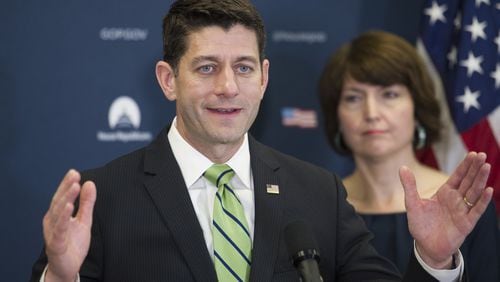The House voted narrowly entirely along party lines Thursday to pass a Republican bill to repeal and replace Obamacare after months of infighting and false starts.
The legislation squeaked through the chamber with only one vote to spare, 217-213. No Democrats voted in favor of the bill, known as the American Health Care Act, and 20 Republicans rejected it. Members of Georgia’s congressional delegation voted strictly along party lines.
RELATED: 5 Things to know about the GOP health bill
IN-DEPTH: How Georgia Congress members voted on the bill
The bill’s passage is a substantial victory for President Donald Trump, who campaigned on a pledge to reverse his predecessor’s signature policy achievement, and House Speaker Paul Ryan, who can now argue that he has a handle on his unruly conference in the lead-up to a major tax reform push.
Odds are the measure will change substantially once it moves to the Senate. Majority Leader Mitch McConnell has only two Republican votes to spare and must contend with arcane rules that limit the kinds of policy he can include in such legislation.
EXCLUSIVE: GOP plan could hurt Georgia Trump voters
MORE: Will Blue Cross leave the Georgia insurance exchange?
As it stands now, the GOP bill could have a dramatic impact on tens of thousands of Georgians.
About half a million Georgians have Obamacare coverage and the vast majority get tax credits to help them afford that insurance. Under the GOP plan, however, many could lose out on thousands of dollars, forcing some to drop coverage altogether.
It would offer tax credits, like Obamacare does, but those credits would be based on people’s age rather than income. That would benefit younger, higher-income Americans and mean less financial help for poorer, older individuals, especially those living in rural areas.
Meanwhile, Georgians with higher incomes could qualify for tax credits, which they couldn’t do under Obamacare because they made too much money.
EXCLUSIVE: How the GOP bill would affect people in every Georgia county
LIVE UPDATES: Health care vote in the House
Georgians with pre-existing conditions, such as someone who has had a heart attack or cancer, could also be hit hard. That’s because the bill would allow states to opt out of the Obamacare mandate that insurers not charge people with a poor health history higher premiums.
Experts say such a move would lead to higher premiums, which some people simply couldn’t afford to pay. An estimated nearly 1.8 million Georgians have a pre-existing condition. The vast majority get coverage through work or other source, but those who buy their own coverage on the individual insurance market could face higher prices.
It would also fundamentally change how the federal government pays states for Medicaid. Instead of paying states a certain percentage of all of their Medicaid costs, it would allow states to opt for “block grants” that are lump sum payments and give them more flexibility in who the program would cover. Experts say such a move would almost certainly reduce enrollment and cut services.
TRUMP: Twitter weighs in on religious liberty
Republicans say the bill represents a better alternative to Obamacare that will help inject more competition into the marketplace, which could lower health care premiums.
At a Rose Garden ceremony with faith leaders on Thursday, President Donald Trump said that “we’re going to take care of a lot of people” with their health care needs. “We’ve all fought very hard to be able to do that.”
Democrats argue, however, the bill will deal a severe blow to millions of Americans — increasing costs and forcing many to drop their health insurance.
“It’s just a terrible bill that is going backwards and anybody who votes for it, as Nancy Pelosi said, is tattooing their forehead and voters are going to remember what those Republicans in the House are doing today in 2018,” said U.S. Rep. Hank Johnson, D-Lithonia.
Under the original version of the bill, an estimated 24 million Americans would lose their health insurance coverage by 2026, according to a report by the nonpartisan Congressional Budget Office.
The CBO, Congress’s scorekeeper, has not yet scored the bill in its latest form with the new amendments relating to pre-existing conditions and essential health benefits, and the House is expected to vote without one. The decision to let states opt out of Obamacare’s mandate that insurers can’t charge people more because of their health history would likely lead to more people losing insurance.
The bill now heads to the Senate where it will face stiff opposition from not just Democrats but also moderate conservatives. Those Republicans have the same fears their counterparts in the House faced — worrying that the bill would strip tens of millions of Americans of their health coverage.
Because of strong opposition among conservatives in the Senate, they are expected to drastically rewrite the bill at minimum. If the bill is ultimately able to make it out of the Senate, the final product will almost surely look very little like the House’s version.







